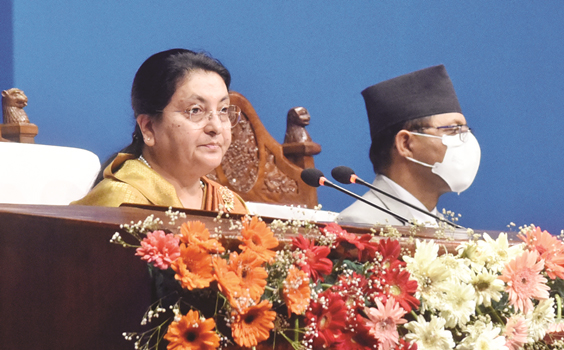Programme to build industrial villages, revive sick enterprises

By Modnath Dhakal
Kathmandu, May 16: The government has announced policy to protect and incentivise the industries that have high productivity, make the country self-reliant in respective products and help increase export.
Presenting the government’s policy and Programme for the Fiscal Year 2020/21 in the Federal Parliament on Friday, President Bidya Devi Bhandari said that the industry sector programmes would be run to increase productivity and production with the maximum use of available resources, capital, skills and technology.
“Government investment will be increased in industrial villages, zones and special economic zones (SEZ), and industrial villages will be established in 45 local bodies,” she said.
Industrial bases are being created in Damak of Jhapa, Murtiya of Sarlahi, Mayurdhap of Makawanpur, Shaktikhor of Chitwan, Motipur of Rupandehi, Naubasta of Banke, Lamki of Kailali and Daiji of Kanchanpur.
Inter-country economic zones will be established with the support from India and China, the President said.
Programmes will be launched to operate the government-owned sick industries with new management, methods and process in collaboration with the private sector.
Likewise, establishment and expansion of agriculture, food and forest-products processing, essential commodities, medicines and health materials producing enterprises and industries that use domestic raw materials will be promoted.
Collaboration among the three levels of the government will be forged to launch a campaign for the expansion of the micro, cottage, small and medium enterprises across the country as the foundation for the utilisation of local resources, agricultural and non-agricultural processing, employment generation and prosperity, said the President.
National Productivity and Economic Development Centre and Industrial Enterprise Development Institute will be merged for the production of human resources required for the industries, develop productivity, skill development and enterprise promotion.
The single window service centre at the Department of Industry will be equipped with modern information technology and provided with required rights. “The company registration will be decentralised and process of registration and liquidation of a company would be simplified and fast,” said President Bhandari.
Similarly, phosphorite investigation will be started in Baitadi and Bajhang and petroleum in Dailekh. The government will promote the processing and export of precious and semi-precious stones.
The policy document also includes favoured trade agreement with Bangladesh and Bhutan and expansion of trade with third countries via ports in China – the facility was provided to Nepal by the northern neighbour last year.
Construction of integrated check post (ICP) will be started in Nepalgunj-India border, Trade Special Zone in Haraiya of Kaliali and dry port in Dodhara-Chandani of Kanchanpur next year.
Likewise, feasibility study will be conducted to develop trade infrastructure in Yari of Humla, Korala of Mustang, Kimathanka of Sankhuwasabha and Olangchungola of Taplejung district.
Establishment of Export House, use of collective trademarks, study of natural resource-based products, development of integrated trade sector master plan, and integrated market monitoring are also included in the policy document.
The government has announced to launch a business rehabilitation programme to make the production system stronger. Available natural resources, means and democratic dividends would be utilised in productive sector.
Stating that there was a significant improvement in the business and investment environment in the country due to policy and process reforms, the President announced to attract additional foreign investment in large infrastructure and other productive sectors.
Recent News

Do not make expressions casting dout on election: EC
14 Apr, 2022
CM Bhatta says may New Year 2079 BS inspire positive thinking
14 Apr, 2022
Three new cases, 44 recoveries in 24 hours
14 Apr, 2022
689 climbers of 84 teams so far acquire permits for climbing various peaks this spring season
14 Apr, 2022
How the rising cost of living crisis is impacting Nepal
14 Apr, 2022
US military confirms an interstellar meteor collided with Earth
14 Apr, 2022
Valneva Covid vaccine approved for use in UK
14 Apr, 2022
Chair Prachanda highlights need of unity among Maoist, Communist forces
14 Apr, 2022
Ranbir Kapoor and Alia Bhatt: Bollywood toasts star couple on wedding
14 Apr, 2022
President Bhandari confers decorations (Photo Feature)
14 Apr, 2022











